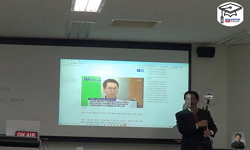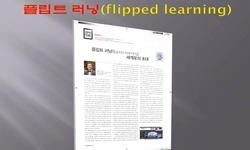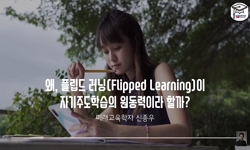This study is to examine whether elementary science textbooks in Korea and Singapore are applicable to flipped learning. By comparative study we sought to identifying appropriate features of science textbooks for learner-centered teaching. We analyzed...
http://chineseinput.net/에서 pinyin(병음)방식으로 중국어를 변환할 수 있습니다.
변환된 중국어를 복사하여 사용하시면 됩니다.
- 中文 을 입력하시려면 zhongwen을 입력하시고 space를누르시면됩니다.
- 北京 을 입력하시려면 beijing을 입력하시고 space를 누르시면 됩니다.

초등학교 과학 교과서의 거꾸로 수업 활용 가능성에 대한 교사들의 인식 - 한국과 싱가포르 교과서 비교 연구 - = Elementary Teachers` Conceptions about Applicability of Science Textbooks for Flipped Learning - Comparative Study of Korean and Singaporean Textbooks -
한글로보기https://www.riss.kr/link?id=A103204684
- 저자
- 발행기관
- 학술지명
- 권호사항
-
발행연도
2017
-
작성언어
-
- 주제어
-
KDC
300
-
등재정보
KCI등재
-
자료형태
학술저널
- 발행기관 URL
-
수록면
163-179(17쪽)
-
KCI 피인용횟수
2
- DOI식별코드
- 제공처
-
0
상세조회 -
0
다운로드
부가정보
다국어 초록 (Multilingual Abstract)
This study is to examine whether elementary science textbooks in Korea and Singapore are applicable to flipped learning. By comparative study we sought to identifying appropriate features of science textbooks for learner-centered teaching. We analyzed text pages on the unit of `Working of electricity` in Korean elementary science textbook for sixth grade and three chapters of `Electric circuits, Using electricity, Conductors of electricity` in Singaporean elementary textbook, `Science : My pals are here!`. We designed evaluating frameworks for science textbooks based on the four pillars of flipped learning. and applied it to 10 elementary teachers evaluate two textbooks. They evaluated textbooks with Likert Scale items and wrote detailed statements and exemplars about their choices. We analyzed the teachers` evaluative descriptions inductively and chose commonly mentioned characteristics. Based on the analysis, we got to the conclusion about specific features of two elementary science textbooks in terms of flexible environment, learning culture, intentional contents, and teachers` expertises. Implications for improving science textbooks towards flipped learning and learner-centered teaching through comparative study were discussed.
참고문헌 (Reference)
1 김대현, "한국의 수업과 평가에서의 교과서 활용과 전망" 교육발전연구소 25 (25): 21-44, 2015
2 장경원, "학습자 중심 교육에 대한 교육행정가, 교사, 예비교사의 인식 비교 연구" 학습자중심교과교육학회 9 (9): 315-339, 2009
3 강석진, "초등학교 과학 교과서의 읽기자료에 대한 교사와 학생의 인식" 한국초등과학교육학회 32 (32): 315-326, 2013
4 박주현, "제7차 초등학교 과학 교과서 물질 영역에 제시된 발문 분석" 한국초등과학교육학회 26 (26): 551-557, 2007
5 정하나, "우리나라와 싱가포르의 초등학교 과학 교과서에 제시된 물리 영역 탐구 활동의 특징 비교" 과학교육연구소 36 (36): 139-152, 2012
6 이종옥, "역량기반 교육모델 관점의 플립수업 성과에 관한 연구" 사범대학부속중등교육연구소 63 (63): 505-538, 2015
7 최상호, "모바일 장치를 활용한 거꾸로 수업의 적용가능성 탐색" 사범대학부속중등교육연구소 64 (64): 451-480, 2016
8 나지연, "과학수업에서 학생의 일상경험 도입에 대한 초등교사의 인식과 실행 및 배경요인" 한국과학교육학회 34 (34): 635-645, 2014
9 권치순, "과학수업에서 실험관찰 교과서에 대한 교사들의 인식과 활용 방안" 대한지구과학교육학회 4 (4): 12-19, 2011
10 신영준, "거꾸로 수업을 지원할 수 있는 과학교과서 모형 개발 연구" 과학교육연구소 40 (40): 90-102, 2016
1 김대현, "한국의 수업과 평가에서의 교과서 활용과 전망" 교육발전연구소 25 (25): 21-44, 2015
2 장경원, "학습자 중심 교육에 대한 교육행정가, 교사, 예비교사의 인식 비교 연구" 학습자중심교과교육학회 9 (9): 315-339, 2009
3 강석진, "초등학교 과학 교과서의 읽기자료에 대한 교사와 학생의 인식" 한국초등과학교육학회 32 (32): 315-326, 2013
4 박주현, "제7차 초등학교 과학 교과서 물질 영역에 제시된 발문 분석" 한국초등과학교육학회 26 (26): 551-557, 2007
5 정하나, "우리나라와 싱가포르의 초등학교 과학 교과서에 제시된 물리 영역 탐구 활동의 특징 비교" 과학교육연구소 36 (36): 139-152, 2012
6 이종옥, "역량기반 교육모델 관점의 플립수업 성과에 관한 연구" 사범대학부속중등교육연구소 63 (63): 505-538, 2015
7 최상호, "모바일 장치를 활용한 거꾸로 수업의 적용가능성 탐색" 사범대학부속중등교육연구소 64 (64): 451-480, 2016
8 나지연, "과학수업에서 학생의 일상경험 도입에 대한 초등교사의 인식과 실행 및 배경요인" 한국과학교육학회 34 (34): 635-645, 2014
9 권치순, "과학수업에서 실험관찰 교과서에 대한 교사들의 인식과 활용 방안" 대한지구과학교육학회 4 (4): 12-19, 2011
10 신영준, "거꾸로 수업을 지원할 수 있는 과학교과서 모형 개발 연구" 과학교육연구소 40 (40): 90-102, 2016
11 신영준, "거꾸로 수업(Flipped Learning)을 적용한 초등학교 과학과 생명 영역 수업의 효과 탐색" 한국생물교육학회 44 (44): 60-71, 2016
12 신영준, "거꾸로 수업(Flipped Learning)에서 과학 교사들이 겪는 인식과 어려움 분석" 한국과학교육학회 36 (36): 159-166, 2016
13 정진아, "거꾸로 교실을 적용한 과학수업이 초등학생의 과학 학습 동기 및 학업성취도에 미치는 영향" 한국생물교육학회 43 (43): 333-343, 2015
14 Flipped Learning Network (FLN), "The four pillars of FLIPTM"
15 Hamdan, N, "The flipped learning model: A white paper based on the literature review titled a review of flipped learning"
16 Hann, A., "The effect of science reading program on science learning in elementary school" 13 : 159-178, 2001
17 OECD, "The definition and selection of key competencies:Executive summary" OECD
18 Sosniak, L., "The 9% challenge: Education in school and society"
19 Boyd, S., "Shifting the frame: Exploring integration of the Key Competencies at six normal schools" New Zealand Council for Education Research 2006
20 Kim, J., "Seoul: A study on the development of school textbook model" Korea Institute for Curriculum and Education 1998
21 Kim, K., "Primary teachers’ views about the workbook Experiment & observation and its practical usage" Chuncheon National University of Education 2002
22 Marshall Cavendish Education, "News & Events"
23 Gordon, J., "Key competences in Europe: Opening doors for lifelong learners across the school curriculum and teacher education" CASE 2009
24 Lage, M., "Inverting the classroom : A gateway to creating an inclusive learning environment" 31 (31): 30-43, 2000
25 Lee, K., "Improvement plan of the subject curriculum based on the key competencies-focusing on the alignment of curriculum, teaching․learning methods and educational assessment" Korea Institute for Curriculum and Education 2013
26 Bergmann, J., "Flip your classroom:Research every student in every class every day" International Society for Technology in Education 2012
27 Ryu, S., "Debates on the definition of learning-oriented flipped learning for class innovation" 20 (20): 67-80, 2014
28 Stern, L., "Can middle school science textbooks help students learn important ideas? Findings from Project 2061’s curriculum evaluation study : Life science" 41 (41): 538-568, 2004
29 Strauss, A. L., "Basics of qualitative research: Techniques and procedures for developing grounded theory" Sage Publications 1998
30 Binkley, M., "Assessment and teaching of 21st century skills" Springer 17-66, 2012
31 Luke, A., "A model for researchbased state professional development policy" 37 (37): 1-21, 2009
32 Jarvis, W., "A Large Class Engagement (LCE) model based on Service-Dominant Logic (SDL) and flipped classrooms" 41 : 1-24, 2014
33 최윤미, "2007년 개정교육과정에 따른 초등 과학교과서에 제시된 발문의 유형 분석" 과학교육연구소 36 (36): 120-129, 2012
동일학술지(권/호) 다른 논문
-
초등과학 영재학급 학생과 일반학급 학생의 과학 학습정서와 과학적 상상력 비교
- 한국초등과학교육학회
- 안태훈 ( Ahn Tae-hun )
- 2017
- KCI등재
-
저자 키워드 네트워크 분석을 통한 초등 환경교육의 연구 동향 탐색
- 한국초등과학교육학회
- 김동렬 ( Kim Dong-ryeul )
- 2017
- KCI등재
-
2009 개정 과학교육과정에 따른 초등학교 과학 교과서의 읽기자료 분석
- 한국초등과학교육학회
- 고한중 ( Koh Hanjoong )
- 2017
- KCI등재
-
과학중심 STEAM 수업을 통한 학습자가 인식하는 21세기 학습자 역량 변화
- 한국초등과학교육학회
- 심수민 ( Shim Su-min )
- 2017
- KCI등재
분석정보
인용정보 인용지수 설명보기
학술지 이력
| 연월일 | 이력구분 | 이력상세 | 등재구분 |
|---|---|---|---|
| 2026 | 평가예정 | 재인증평가 신청대상 (재인증) | |
| 2020-01-01 | 평가 | 등재학술지 유지 (재인증) |  |
| 2017-01-01 | 평가 | 등재학술지 유지 (계속평가) |  |
| 2013-01-01 | 평가 | 등재학술지 유지 (등재유지) |  |
| 2010-01-01 | 평가 | 등재학술지 유지 (등재유지) |  |
| 2008-01-01 | 평가 | 등재학술지 유지 (등재유지) |  |
| 2005-01-01 | 평가 | 등재학술지 선정 (등재후보2차) |  |
| 2004-01-01 | 평가 | 등재후보 1차 PASS (등재후보1차) |  |
| 2003-01-01 | 평가 | 등재후보학술지 선정 (신규평가) |  |
학술지 인용정보
| 기준연도 | WOS-KCI 통합IF(2년) | KCIF(2년) | KCIF(3년) |
|---|---|---|---|
| 2016 | 1.21 | 1.21 | 1.35 |
| KCIF(4년) | KCIF(5년) | 중심성지수(3년) | 즉시성지수 |
| 1.34 | 1.28 | 1.783 | 0.5 |





 ScienceON
ScienceON KISS
KISS






